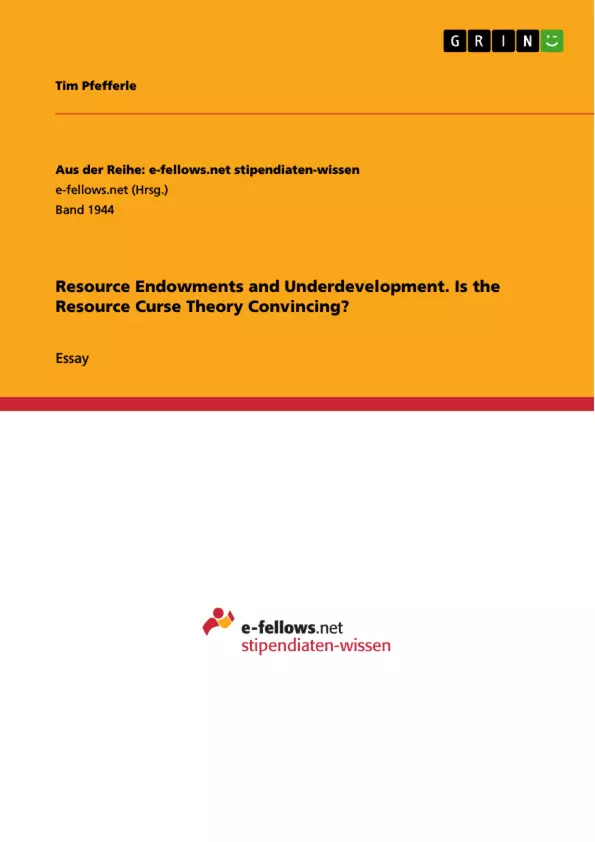Given the recent attention paid to the concept, a number of studies have investigated the intricacies of the resource curse. This essay will therefore examine whether the resource curse theory is convincing. To what extent can it explain phenomena relating to lack of development and economic growth? Given the vastness of the literature covering the resource curse, the essay will attempt to establish some order by presenting the most significant empirical findings, followed by an account of economics-based, institutional and anthropological understandings of the phenomenon. It will be argued that the resource curse concept is perhaps a misguided attempt to provide a heuristic device in order to understand broader development challenges. While institutions are indeed a crucial component determining the effects resource dependence can have on societal welfare, a deeper anthropological account highlights some of the gaps inherent in subscribing to the idea of a curse.
Table of Contents
- Introduction
- What do we mean when we say resource curse?
- It's the economy, stupid!
- Institutions, Institutions, Institutions
- Anthropologists to Save the Day
Objectives and Key Themes
This essay examines the resource curse theory and its validity in explaining phenomena related to lack of development and economic growth. It delves into empirical findings, economic, institutional, and anthropological perspectives on the resource curse, arguing that the concept might be a misguided attempt to understand broader development challenges.
- The Resource Curse Theory: Its Validity and Limitations
- Economic Explanations of the Resource Curse
- Institutional Factors Contributing to the Resource Curse
- Anthropological Insights on the Resource Curse
- The Importance of Qualitative Research in Understanding the Resource Curse
Chapter Summaries
- Introduction: The essay introduces the resource curse theory and its increasing prominence in development economics, highlighting the paradox of resource endowments leading to underdevelopment. It outlines the essay's structure, focusing on empirical findings and various perspectives on the resource curse.
- What do we mean when we say resource curse?: This section explores the linguistic and historical evolution of the resource curse concept, contrasting it with the earlier notion of a "resource blessing." It delves into the paradox of resources potentially hindering economic development, drawing on insights from prominent economists like Atkinson and Hamilton, and highlighting the resource movement and spending effects.
- It's the economy, stupid!: This chapter focuses on economic explanations for the resource curse, including the Prebisch-Singer thesis and the Dutch Disease model. It discusses the potential negative impacts of resource dependence on economic growth, highlighting the role of price volatility, human capital erosion, and debt accumulation. The chapter also acknowledges the limitations of economic explanations, suggesting that other factors like institutional arrangements and social contexts are crucial for understanding the resource curse.
- Institutions, Institutions, Institutions: This section delves into the significance of institutional factors in shaping the resource curse. It emphasizes the crucial role of institutions in mediating the relationship between resource endowments and economic performance, citing examples like Botswana's positive experience with resource-led growth due to strong institutions. The chapter discusses the role of corruption, weak accountability, and rent-seeking behavior in hindering development, and the influence of colonial history on institutional development in resource-rich countries.
- Anthropologists to Save the Day: This chapter critiques the reliance on macro-level, quantitative research in the resource curse literature, arguing that anthropological perspectives can provide crucial insights into the complexities of resource extraction at the local level. It emphasizes the importance of understanding the sociocultural impact of resource extraction, the potential for local conflict, and the need for qualitative research to unveil the nuanced relationships between resources and development.
Keywords
Key terms and concepts associated with this text include resource curse, development economics, economic growth, resource dependence, Dutch Disease, rent-seeking, institutions, colonial history, anthropology, and qualitative research.
- Citation du texte
- Tim Pfefferle (Auteur), 2016, Resource Endowments and Underdevelopment. Is the Resource Curse Theory Convincing?, Munich, GRIN Verlag, https://www.grin.com/document/335978



